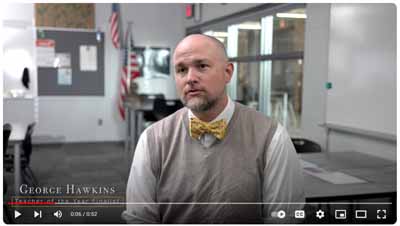George Hawkins
U.S. History, AP Government, and Dual credit Government, Jefferson High School, Sioux Falls

What made you decide to go into teaching?
I student taught in 2003-04 and didn’t like the student teaching experience. So I decided to go to law school.
I went to law school, and I was working as a lawyer. My caseload was a lot of abuse and neglect cases, and that was soul-sapping. It’s not something I could do day in, day out, for years on end. So I was looking around, and I heard about New-Tech High School in Sioux Falls. It was a different teaching style; project-based learning – teaching through the project itself. Kids work on projects, and instead of a test, they present their projects.
When it came time for renewal [of my teaching certificate], I kept it just in case, and I’m so glad my wife told me to do that. I switched to teaching at New Tech, and it worked. Teaching through project-based learning worked for me. I was able to help kids learn by doing – they responded well to it, and I love being able to lead that way.
What’s the best part of teaching?
Getting to work with kids, hands down. Every day is a new day with them. Even if the day before they were getting frustrated and annoyed with you, they start fresh with you every day.
You’re working with tomorrow, which is awesome. You get to be a part of that. You see a lightbulb go off when they finally understand something. That’s awesome to see that in another person.
What’s the most challenging part of teaching?
Knowing that every single day you have to be ready. You don’t know what today’s going to bring. There’s not a day off. You can’t just do it halfway for a day. You constantly have to be “on” and be prepared for whatever comes at you. There isn’t an “off” day at all.
If you could go back in time and give yourself some advice at the start of your career, what would that advice be?
The route that I took to get to teaching could have been more streamlined; I could have made it easier for myself. But all those missteps and taking different routes first got me to where I am right now. If anything, I think in terms of what I would tell a new teacher, and that’s just, try things. When a principal or coworker tells you to do something, say, “yep.” Try new things. All of the things I’ve done have led me to where I am now, and I’m thankful for that.
Do you have any, “it’s weird but it works” teaching strategies?
As far as I know, I don’t think that what I do is odd or weird, but I would say, I try to put in experiential learning in the classroom. I try use a classroom economy. We can use it as a content builder, but we can also use it as a teaching tool. Kids get classroom money, and they put it in a bank. They use the money to purchase the type of presentation material they are going to use. They also can use it for the rights to say certain words, like “I” or “me.” And if they don’t buy the rights to that, they have to adjust so that they can get by without using those words or materials.
They look at as the fun and the game, and it is a way of looking at the 1920’s stock market experience, and how that went down. But it teaches more than just that. It does two things -- one, to help build soft skill, and two, to teach content.
You got your teaching certificate, then went to law school and worked as a lawyer before you began teaching in Sioux Falls. How did the experience of law school and having a law career affect how you teach today?
Some of it is subtle – going to law school is a 3-year time management course. The way my brain functions, I analyze things now. In terms of my experience practicing law, I think about it a lot in how I can make an impact on kids’ lives.
There’s a safety net that should be in place to help kids stay out of the courts. It starts with families, then the schools, and if that fails, they often end up in corrections. My role as a teacher is helping those kids take care of themselves so they don’t get to that third level, the corrections. I can be there to help them latch on to some positivity and make an improvement in their lives, to help them become who they can be.
